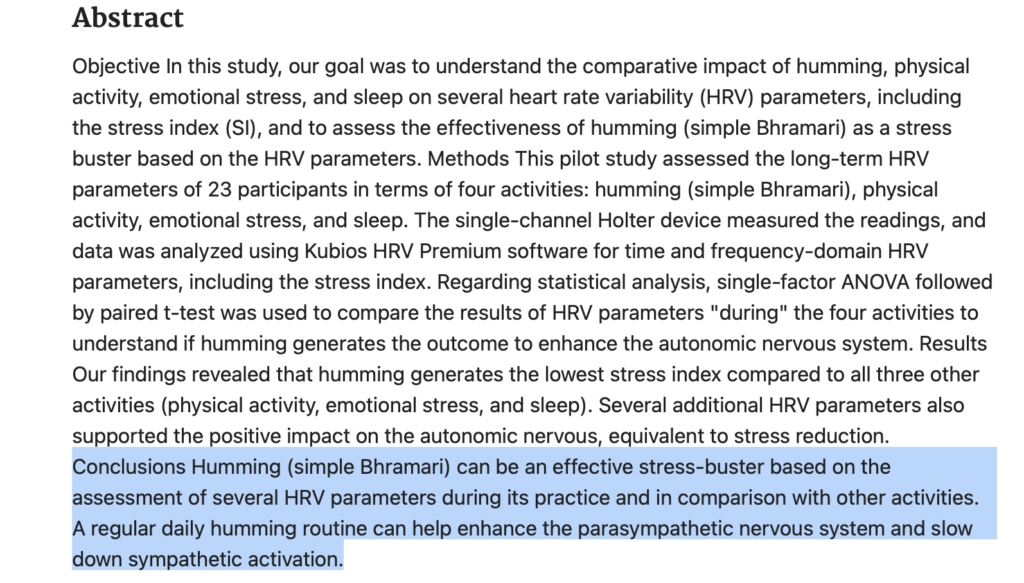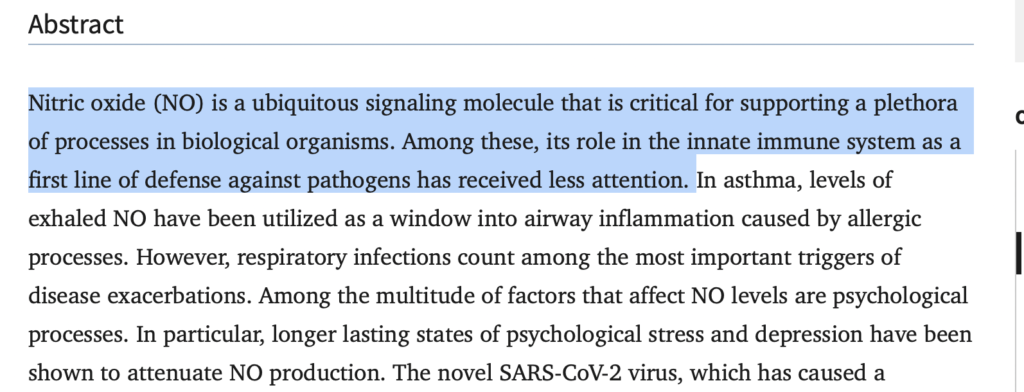The Secret of Humming: A Path to Inner Calm
Are you aware of your breathing right now?
Or did this question just bring it to your attention?
Typically, it’s only when our nose is blocked or when pollution affects the air we breathe that we realize the significance of each breath. In moments of anxiety or chronic stress, our breathing becomes shallow and quick, signaling that our nervous system is in a state of fight or flight.
In today’s fast-paced world, the ancient wisdom of mindful breathing, humming, and chanting is making a comeback. These simple techniques can powerfully shift our body from a state of stress (the sympathetic nervous system) to relaxation and healing (the parasympathetic nervous system). Intriguingly, this shift also has an enormous effect on our vagus nerve, a key player in reducing stress.
The Link Between Breath and Stress: Shallow vs. Deep Breathing
When we’re under stress, our body automatically moves into ‘fight or flight’ mode, also known as the sympathetic nervous system response. This response evolved to protect us, but chronic stress can keep us in this heightened state, leading to a range of health issues, from sleep disorders to digestive problems and even heart disease. Shallow breathing is common during stress, signaling to the brain that the body needs to stay on alert.
But here’s the good news: with intentional breathing and practices like humming, we can guide our body into the ‘rest and digest’ mode, governed by the parasympathetic nervous system. In this mode, our body naturally slows down, prioritizing digestion, relaxation, and cellular repair.

Modern Science Meets Ancient Practice: The Frequencies of Chanting and Humming
Humming, also known as Bhramari pranayama (with ‘bhramari‘ meaning ‘bee’ in Sanskrit), has been used by yogis for centuries to calm and relax the nervous system. A practice with roots in ancient cultures worldwide, is gaining renewed attention from scientists who are uncovering the physical and psychological benefits of this seemingly simple technique.
Across various cultures, humming has been central to religious and spiritual practices, with rituals like the ‘OM’ chant in Hinduism and Buddhism, the ‘Aum’ sound in yoga, and Gregorian chants and other hymns in Christian traditions.
They were often designed at frequencies that calm the mind, helping people access a meditative state. Science now reveals that these sounds can indeed influence brain wave activity, encouraging slower, calming alpha waves, which are associated with relaxation and mental clarity. This effect of humming extends beyond meditation, supporting emotional resilience and reducing stress in daily life.

The Science of Sound Vibration: How Humming Affects Our Nervous System
When you hum, the vibration produced travels through the nasal cavity and sinuses, generating subtle but powerful resonance within the body. This resonance is far more than just sound; it has a direct impact on the vagus nerve, one of the longest nerves in the body. The vagus nerve connects the brain to various organs, including the heart, lungs, and digestive tract, and it plays a vital role in regulating the parasympathetic nervous system. Activation of the vagus nerve through humming can help shift the body from the sympathetic (fight or flight) response to the parasympathetic (rest and digest) response, lowering stress and promoting relaxation.
Nitric Oxide: The Surprising Health Molecule Boosted by Humming
One of the interesting effects of humming is its ability to boost nitric oxide production in the nasal cavity. Nitric oxide, a naturally occurring gas in the body, has multiple health benefits. It acts as a vasodilator, relaxing and widening blood vessels, which improves blood flow and reduces blood pressure. This is particularly beneficial for cardiovascular health, as increased blood flow can reduce the risk of hypertension and support better circulation.
Additionally, nitric oxide has antimicrobial and antiviral properties. Research published in Brain, Behavior and Immunity Health also shows nitric oxide can help protect the respiratory tract from infections, and its increased production through humming can assist the body’s immune defense system. When humming creates air oscillations in the nasal cavity, it stimulates nitric oxide production up to 20 times higher than regular breathing. This increase in nitric oxide improves airflow and oxygenation, benefiting individuals with respiratory issues like asthma, chronic obstructive pulmonary disease (COPD), and sinusitis.

Stimulating the Vagus Nerve: Humming as a Gateway to Calm
The vagus nerve, sometimes called the wandering nerve due to its long and complex path through the body, plays a key role in regulating mood and stress levels. When you hum, the vibrations activate this nerve, promoting a relaxed state and reducing cortisol, the primary stress hormone of the body.
In moments of high stress or anxiety, a simple humming exercise can initiate a shift toward calmness within seconds. By making humming a regular practice, you help tone the vagus nerve, similar to how exercise strengthens a muscle. Over time, this can make you more resilient to stress and more capable of staying calm in difficult situations.

Health Benefits Confirmed: From Blood Pressure to Respiratory Relief
Humming has been shown to offer a range of health benefits, including:
- Lower Blood Pressure: Through its impact on the vagus nerve and increased nitric oxide, humming helps to lower blood pressure, supporting cardiovascular health.
- Respiratory Benefits: Humming increases nitric oxide production, which dilates the airways, facilitating better breathing and reducing nasal congestion. This can be beneficial for individuals with asthma, COPD, and other respiratory conditions.
- Enhanced Immunity: Nitric oxide’s antimicrobial properties provide the immune system with extra support against respiratory infections, making humming a helpful practice, especially during cold and flu season.
- Improved Sleep Quality: The calming effect of humming before bed helps relax both the mind and body, preparing you for a deeper, more restful sleep.
How to Use Humming for Stress Relief
Ready to try it out?
Here’s a simple step-by-step guide to incorporate humming into your daily routine:
-
Step 1: Find a Quiet Space
Locate a place where you won’t be interrupted. You don’t need absolute silence, but a quiet environment can help you focus.
-
Step 2: Take a Deep Breath
Inhale slowly through your nose, filling your lungs with air. This deep inhalation prepares you for a controlled exhalation.
-
Step 3: Hum as You Exhale
As you exhale, purse your lips slightly and hum softly. Focus on the vibrations in your nasal cavity and around your throat. Aim to make each hum last as long as possible. Repeat this for five to 10 cycles.
-
Step 4: Practice Regularly
You can hum throughout the day, especially when stressed or anxious. Before bed, try a longer session of 10–15 hums to help relax your body and prepare for sleep.

Humming Techniques for Different Situations
- During Moments of High StressInhale for three to four seconds, then hum gently as you exhale for six to eight seconds. This ratio will help slow your heart rate and reduce stress hormones.
- Before BedtimePractice a calming routine: inhale deeply, hum on the exhale, and repeat 10 times. This will relax your blood vessels and improve circulation, helping you drift into a peaceful sleep.
- Morning RoutineA few rounds of humming upon waking can stimulate the vagus nerve, promoting a sense of calm and setting a balanced tone for the day ahead.
A Timeless Practice for Modern Lives
In our search for solutions to the stress epidemic, we often look outward, missing the simple, powerful tools already within us. Humming is a time-tested practice that can help you reconnect with your body, relax your mind, and access a deep sense of calm. Just a few minutes a day can shift your body from ‘fight or flight’ to ‘rest and digest,’ protecting you from the detrimental effects of chronic stress.
So, the next time you feel overwhelmed, remember: all you need to start is a hum.
Disclaimer: The information provided is intended for general wellness purposes and is not a substitute for professional medical advice, diagnosis, or treatment. Always seek the guidance of your physician or other qualified health provider with any questions you may have regarding a medical condition or treatment and keep them in the loop before trying something new.
Are you ready to take control of your well-being and create a healthier, more balanced life?
Take the first step toward lasting well-being—join us today!
Schedule a one-on-one consultation with our yoga experts by calling us at 1800 102 0253 or emailing us at consults@lukecoutinho.com.
ALSO WATCH
https://youtube.com/embed/oVPHE0hdSug
|
From a pimple to cancer, our You Care Wellness Program helps you find a way Talk to our integrative team of experts today 18001020253 |










Leave a Reply